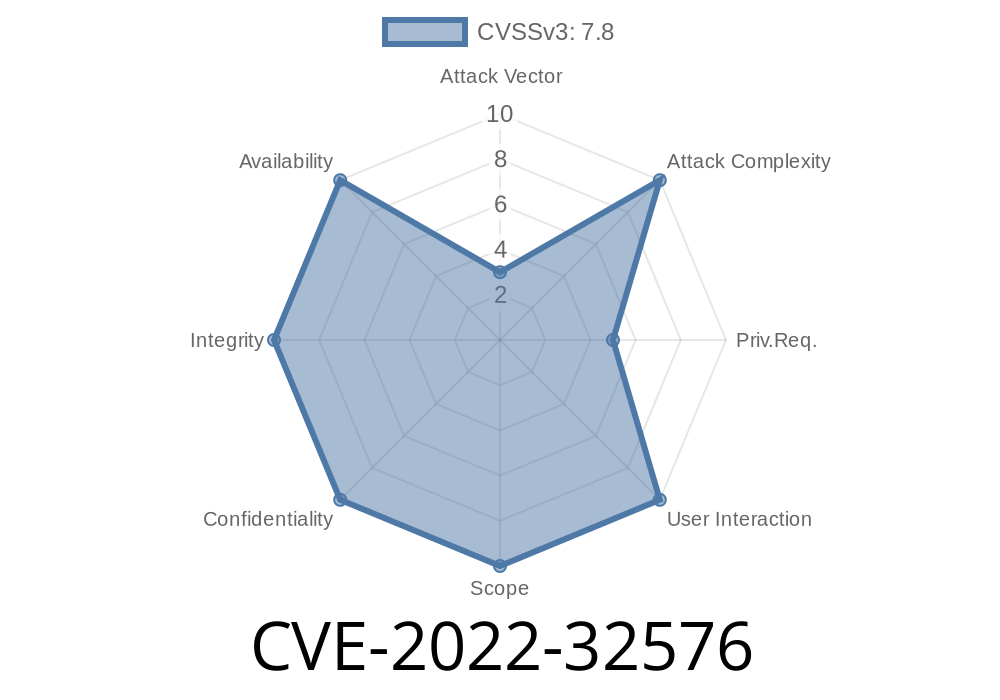In June 2022, Intel released an advisory describing a serious security issue (CVE-2022-32576) in its Unite(R) Plugin Software Development Kit (SDK). This vulnerability can let an authenticated attacker escalate their privileges on the local machine. In this post, we’ll break down what this bug means, show example exploit code, and explain how you can protect yourself. If you work in an environment that uses Intel(R) Unite(R), keep reading!
What Is CVE-2022-32576?
At a high level, this vulnerability is due to an “uncontrolled search path” flaw in the Intel(R) Unite(R) Plugin SDK — specifically, in versions before 4.2.
In plain English:
When the Plugin SDK loads certain components (like DLL files), it doesn't verify the directory these files come from—if an attacker can place a malicious file in a directory higher up in the search order, that file will run instead.
Why Is This Dangerous?
Uncontrolled search path vulnerabilities let attackers “hijack” the way software loads files. By tricking the computer into loading a malicious file, an attacker with limited access could run code as a more privileged user, leading to a full compromise.
Affected software:
Severity: High (CVSS 7.8)
Official advisory:
- Intel Security Advisory INTEL-SA-00602
How Does the Exploit Work?
The vulnerability relies on the search path Windows uses to look for DLLs (Dynamic-Link Libraries). When a program needs a DLL, if it doesn’t specify an exact location, Windows looks through a chain of folders in a specific order. If someone can place a “fake” DLL in one of those directories before the real one, Windows will use the attacker’s file.
In the case of the Intel(R) Unite(R) Plugin SDK, a local user can put a malicious DLL where the Unite process will look for it — for example, in the application directory — and make the process load and run their code.
Example Exploit (Proof of Concept)
This is a simple example to illustrate how this vulnerability would be exploited on a Windows system.
Step 1: Write a Malicious DLL
Suppose the SDK loads a DLL called example.dll on startup.
Create a simple DLL using C or C++ that creates a file or pops a message box to show it ran.
// maldll.c
#include <windows.h>
BOOL APIENTRY DllMain(HMODULE hModule, DWORD ul_reason_for_call, LPVOID lpReserved) {
switch (ul_reason_for_call) {
case DLL_PROCESS_ATTACH:
MessageBox(NULL, "Code Execution!", "CVE-2022-32576 PoC", MB_OK);
break;
}
return TRUE;
}
Compile this with
cl /LD maldll.c
Step 2: Place Malicious DLL in Application Directory
Copy maldll.dll to the same directory as the vulnerable Intel(R) Unite(R) process, but rename it to example.dll (the required DLL name).
Step 3: Launch the Application
When Intel(R) Unite(R) Plugin SDK starts, it will load example.dll from its application directory — triggering your payload.
Note
In a real attack, the payload could add a new administrator account, launch a reverse shell, etc. The message box is just for demonstration.
How to Protect Against This Vulnerability
Intel’s Fix:
Install Intel(R) Unite(R) Plugin SDK version 4.2 or later. These versions correctly control the search path used to load DLLs, blocking this method of privilege escalation.
- Unite SDK Download
Upgrade immediately to the latest version of Intel(R) Unite(R) Plugin SDK.
2. Restrict write access to directories located in the application search path (especially application directories).
3. Consider using Windows features like SafeDllSearchMode and DllDirectory to limit DLL hijacking risk.
References
- Intel Security Advisory INTEL-SA-00602
- NIST CVE Record
- About DLL Search Order
Summary
CVE-2022-32576 is a critical uncontrolled search path vulnerability in older versions of Intel(R) Unite(R) Plugin SDK. By exploiting how the software loads DLL files, a local attacker could take over a computer. Fortunately, updating to SDK version 4.2 or later closes this hole. Don’t delay in updating if your organization uses Intel(R) Unite(R), and always restrict file write permissions in sensitive directories.
Timeline
Published on: 05/10/2023 14:15:00 UTC
Last modified on: 05/22/2023 14:11:00 UTC
